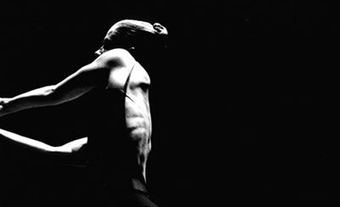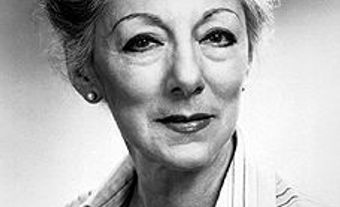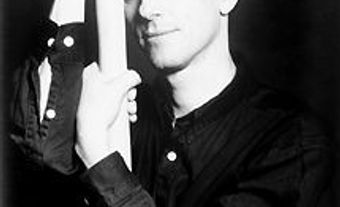Marie Uguay, poet (born 22 April 1955 in Montréal, Québec; died 26 October 1981 in Montréal). This young poet was truly a shooting star in the firmament of Québec poetry. Recognized for her immense talent and distinctive style, she died too young, after a difficult struggle with cancer.
Life and Works
Marie Uguay (née Lalonde) was born in the Côte-Saint-Paul district of Montréal and lived there her whole life. Her parents came from modest backgrounds. Her maternal grandfather, a manual labourer, had successfully reinvented himself as a musician through sheer determination, and it was he who encouraged the young Marie to pursue an interest in writing and the arts. She ended up adopting his last name as a tribute to his example of how one could change one’s life and achieve fulfilment through the arts. She regarded him as her primary influence — the first person who made her see the power of the written word.
As a young child, Marie was already writing stories and showing an interest in art, as well as tremendous artistic talent, but it was around the age of 15 that she began to write poetry. In 1976, Les Éditions du Noroît published her first collection of poems, Signe et rumeur,which she hand-lettered and illustrated herself to impart the intimate, personal feeling that characterizes all of her work. Her life partner, Stéphan Kovacs, whom she met while studying at the Université du Québec à Montréal, also contributed photographs to two of her works. Marie and Stéphan remained together until her death.
Uguay’s next two works were not published until after she died: L’Outre-Vie in 1979 and Marie Uguay : autoportraits in 1982. A volume of her selected poems, translated into English by Daniel Sloate, was published in 1990 by Guernica. Another work in French, Journal, edited, compiled and annotated by Kovacs,also was published posthumously, in 2005.
As soon as Signe et rumeur appeared, Uguay’s intimate poetry drew attention from readers. It offers a living blend of feelings of ecstasy and powerlessness before nature:
a leaf-stripped tree
where the stark sun moans
the shed shimmers
in lividity’s unbroken absence
overhead no bird flies
no breeze tosses the hair
or kisses the cheeks
the lips move ever so little
in the decayed white of the shadows
a night-light burning forgotten at noon
only in dreams does the heart still beat
Though her career was regrettably short, Uguay participated in many projects. Her works appeared in the magazines Estuaire, Possibles and Vie des arts, and, along with other well known Québec poets such as Lucien Francoeur, Michèle Lalonde and Anne Hébert, she took part in a reading that directors Jean-Claude Labrecqueand Jean-Pierre Masse captured in their film La Nuit de la poésie, 28 mars 1980 (Poetry Night, 28 March 1980). Impressed with Uguay’s determination in the face of her illness as well as with her poetry, Labrecque also shot a series of interviews with her shortly before her death and made them into a film, Marie Uguay (NFB, 1982).
A Sudden, Tragic End
In 1977, Uguay learned that she had bone cancer, and the resulting suffering naturally influenced her work. After her devastating diagnosis, she had to spend two months in hospital and then have a leg amputated — a terrible sacrifice for such as sensitive young woman who so loved spending time in nature. Though she continued to write and held her head high, her many trips to hospital eventually coloured her vision. In her second collection, L’Outre-vie (1979), one can feel that her life has taken a detour; her frequent frustration and discouragement have made her physical and psychological pain even harder to endure.
Though Uguay learned to walk again with an artificial limb, the experience of losing a leg had definite repercussions. A trip to Paris that she made after completing L’Outre-vie ended on a sad note; in a city best discovered on foot, she felt limited by her disability.
On returning to Québec, Uguay began receiving treatments to hold her cancer in check, but she still had to go back to hospital many times. Over the course of 1981, she finished writing Autoportraits and sat for the interviews for Labrecque’s film, despite numerous cancer-related episodes that forced interruptions in the shooting. She was hospitalized again in September 1981 and died on 26 October of that year, at the age of 26.
Uguay was posthumously awarded the Émile Nelligan prize for young poets, for the body of her work, and the Maison de la culture of the Ville-Émard district in Montréal was named after her in 1982.
The quality and force of Marie Uguay’s poetry, together with her short, tragic life, have marked the history of poetry in Québec. As in the following lines from her collection L’Outre-Vie, a feeling of sadness at this uncompleted life persists in Québec’s collective memory:
an entire voyage remains inside us
and our dream drifts
toward the rest of the world

 Share on Facebook
Share on Facebook Share on X
Share on X Share by Email
Share by Email Share on Google Classroom
Share on Google Classroom


